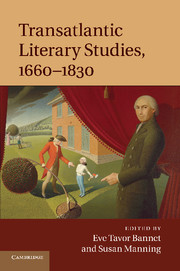Book contents
- Frontmatter
- Contents
- Notes on contributors
- Acknowledgements
- Introduction: British and American genres
- Chapter 1 Transatlantic books and literary culture
- Chapter 2 Transatlantic utopianism and the writing of America
- Chapter 3 Tales of wonder, spiritual autobiographies, and providence tales
- Chapter 4 Life writings
- Chapter 5 Benjamin Franklin and transatlantic literary journalism
- Chapter 6 Theatre, drama, performance
- Chapter 7 Transatlantic American Indians
- Chapter 8 Literature of the ocean
- Chapter 9 “To gird this watery globe”
- Chapter 10 Ghostly and vernacular presences in the black Atlantic
- Chapter 11 Susanna Rowson and the transatlantic captivity narrative
- Chapter 12 Domestic fiction and the reprint trade
- Chapter 13 Transatlantic Gothic
- Chapter 14 Transatlantic Romanticisms
- Chapter 15 Journeys of the imagination in Wheatley and Coleridge
- Chapter 16 Transatlantic historical fiction
- Further reading
- Index
- References
Chapter 1 - Transatlantic books and literary culture
Published online by Cambridge University Press: 05 January 2012
- Frontmatter
- Contents
- Notes on contributors
- Acknowledgements
- Introduction: British and American genres
- Chapter 1 Transatlantic books and literary culture
- Chapter 2 Transatlantic utopianism and the writing of America
- Chapter 3 Tales of wonder, spiritual autobiographies, and providence tales
- Chapter 4 Life writings
- Chapter 5 Benjamin Franklin and transatlantic literary journalism
- Chapter 6 Theatre, drama, performance
- Chapter 7 Transatlantic American Indians
- Chapter 8 Literature of the ocean
- Chapter 9 “To gird this watery globe”
- Chapter 10 Ghostly and vernacular presences in the black Atlantic
- Chapter 11 Susanna Rowson and the transatlantic captivity narrative
- Chapter 12 Domestic fiction and the reprint trade
- Chapter 13 Transatlantic Gothic
- Chapter 14 Transatlantic Romanticisms
- Chapter 15 Journeys of the imagination in Wheatley and Coleridge
- Chapter 16 Transatlantic historical fiction
- Further reading
- Index
- References
Summary
On a visit to the London booksellers Edward and Charles Dilly in the mid-1770s, the Presbyterian clergyman John Ewing (1732–1802) of Philadelphia was accosted by Samuel Johnson for speaking sympathetically about the plight of the American colonists. When Johnson asked Ewing what he knew of the subject, the clergyman responded that he had lived in America his entire life. “Sir, what do you know in America,” Johnson is supposed to have replied. “You never read. You have no books there.” In this remarkable anecdote, Johnson dismissed Ewing's firsthand experience of America in favor of book-learning, which he believed that Americans lacked not because they were unable or disinclined to pursue it, but because, on the eve of the War of Independence, they had no books to read.
Johnson's assertion must have astonished not only Ewing but also the Dilly brothers, who were heavily involved with the American book trade. When Johnson was born in 1709 – seventy years after the first American printing press had been established at Cambridge, Massachusetts – books were indeed scarce in the British-American colonies. At that time, there were few printers and booksellers in America, and the numbers of paper-makers, bookbinders, newspapers, and colleges were each countable on the fingers of one hand. There were no magazines, engravers, or type founders, and no notable libraries besides the three college libraries at Harvard, Yale, and William and Mary – restricted to a privileged clientele – and some private libraries owned by a few clergymen and landowners. During the course of the eighteenth century, however, and especially during its second half, America was transformed into a provincial center of Anglophone print culture. By the time of Johnson's confrontation with Ewing, British America contained dozens of booksellers, printers, and printing presses (including at least one press in each of the thirteen colonies), numerous newspapers and periodicals, and thousands of books, including many held in substantial libraries organized by diverse communities of readers. Although the American War temporarily interrupted these developments, the year of Johnson's death, 1784, marked the beginning of an extraordinary postwar resurgence that would carry the literary culture of the new Republic far beyond its colonial roots.
- Type
- Chapter
- Information
- Transatlantic Literary Studies, 1660–1830 , pp. 10 - 27Publisher: Cambridge University PressPrint publication year: 2011
References
- 1
- Cited by



